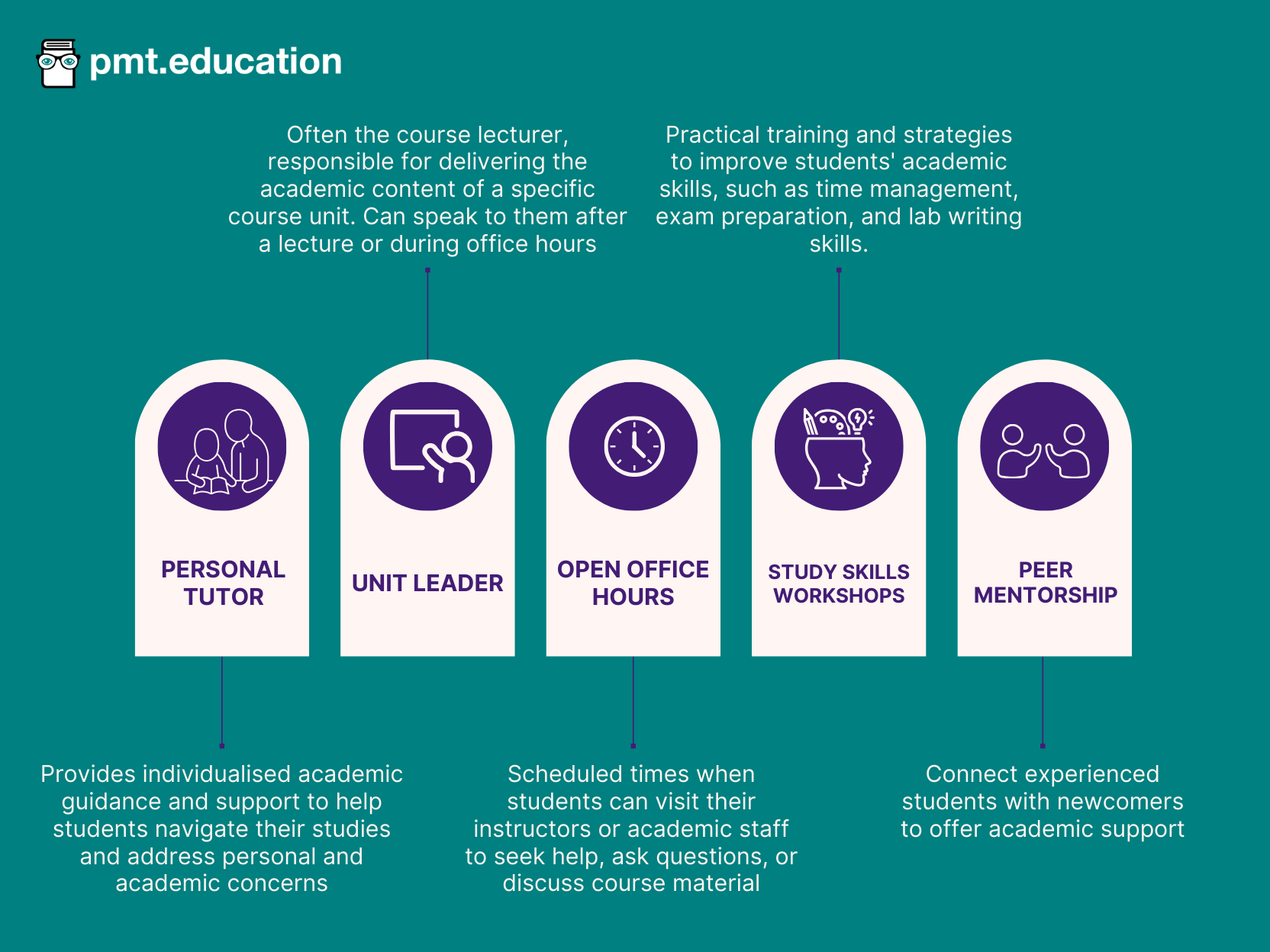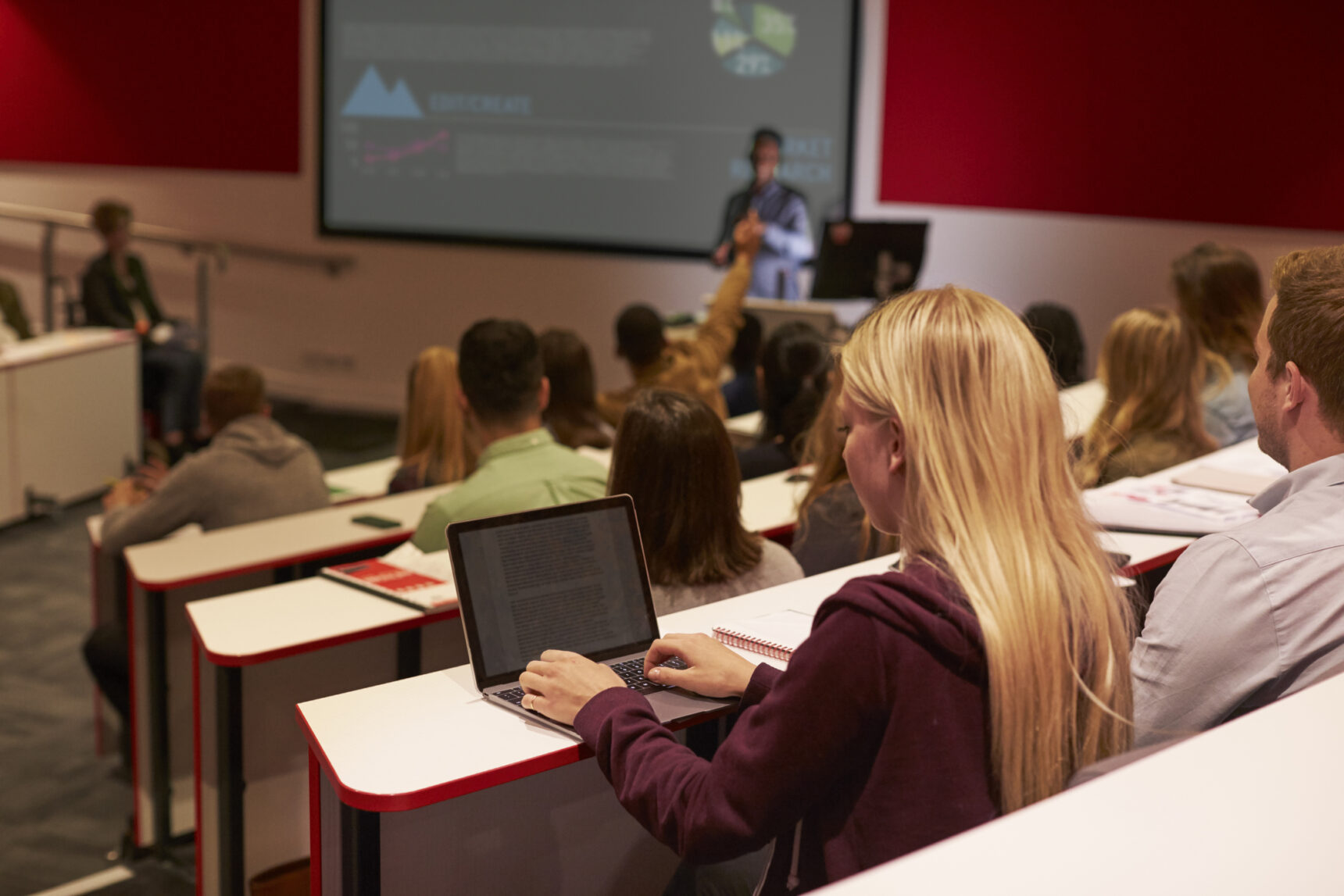Contents:
- 1. Embrace the transition to independent learning
- 2. Transition to university teaching: Make the most of lectures
- 3. Transition to university practicals: Make the most of labs
- 4. Choose optional modules wisely
- 5. Become an active member of your STEM department
- 6. Get organised and prepare for the transition
- 7. Understand the available support for your physical and mental health
Transitioning from secondary school to university can be a significant change, bringing new locations, unfamiliar faces, and different learning methods. It’s normal to need time to adjust to these changes, and it’s important to be patient with yourself. Don’t be discouraged if you can’t grasp everything right away; keep an open mind and remain persistent. With time, you’ll become more comfortable with the new expectations and teaching approaches. This article provides 7 key tips to help make your transition into a STEM degree as smooth as possible.
1. Embrace the transition to independent learning
A crucial aspect of university education is taking personal responsibility for your own learning. At university, you are primarily responsible for your own education. If you do not complete the assigned work, there will be no teacher to prompt or motivate you.
For example, lecturers may assign preparatory work or reading materials to be reviewed before lectures. Failing to complete these assignments can result in difficulty understanding the content of the lecture. However, it is important to recognise that taking responsibility for your education does not mean you must solve every problem independently. Success at university involves not only managing your responsibilities but also knowing when to seek assistance.
Universities provide various resources to support your learning. Teaching staff are available to help and can be contacted via email or during office hours. If you find yourself struggling, it is really important to seek help rather than persevering in isolation.
What are “office hours”?
“Open office” or “drop-in” hours are times when you can go to a member of staff, like a tutor or lecturer, without an appointment. They can help you with academic or pastoral concerns.
Many universities have a personal tutor system, where tutors serve as your primary contact within the university and your department. They provide ongoing support throughout your time at university. Typically, you’ll meet with your personal tutor once a term to discuss your progress, but they are also often available whenever you have academic or personal concerns.
Additional academic support includes peer mentorship, study skills workshops, and consultations with your course leader. The infographic below provides a detailed overview of the common academic support options available to you at university.

Keep an eye out for additional resources your university offers, such as Q&A sessions, revision classes, and academic advising. Also, remember you are surrounded by like-minded peers who share your passion for learning and the subject matter; take advantage of this by collaborating with them on difficult problems and discussing challenging topics.
Top tip
Be confident in asking questions, even if it feels a bit daunting. Utilise all available resources and don’t hesitate to seek clarity and guidance. Surprisingly, lecturers’ open office hours are often underused, so take advantage of this opportunity to engage directly with your tutors and professors. Remember, you’re investing in your education, and you have every right to maximise its value by asking as many questions as needed. Besides, what could be better than discussing your subject with experts in their field?
2. Transition to university teaching: Make the most of lectures
In a lecture setting, a subject expert addresses the cohort, delivering a presentation on a specific topic within the syllabus. For STEM subjects, some lecturers use slideshows containing images and diagrams, while others prefer traditional methods such as using a visualiser or whiteboard. Most lectures involve a mixture of covering content and working through problems.
Taking effective notes during such fast-paced lectures can be challenging. One effective strategy is to pre-read any available materials, textbooks or recommended readings before the lecture. This preparation gives you a foundational understanding of the topic, allowing you to follow along more easily and focus on grasping key concepts during the lecture itself.
Depending on the university and course, you may also have seminars or tutorials scheduled alongside your lectures. These sessions offer a valuable opportunity to delve deeper into the lecture content, discuss any issues, and receive feedback on your work. To make the most of these sessions, note down any questions or areas of confusion you have during the lecture or while solving the problem sheet. Bring this list with you to the seminar to ensure that you address all your concerns and benefit fully from the more personalised support offered.
What is a “seminar”?
These sessions, led by academic staff for small groups, offer a chance to explore lecture content further. In STEM subjects, seminars usually involve reviewing and solving problem sheets, with the instructor going through answers and addressing any questions you may have. Seminars may also be referred to as ‘workshops’.
In terms of note-taking, most universities record lectures and upload these recordings, along with lecture notes, online. This technology is invaluable as it allows you to revisit the material later, reducing the need for continuous, frantic note-taking during the lecture. Instead, you can concentrate on understanding the content in real time and use the recordings to fill in any gaps afterwards.
Given the nature of STEM subjects, where equations and diagrams are prevalent, you might find typed notes less efficient. Consider using handwritten notes for capturing complex equations and diagrams, while typing up text-based information. Experiment with different methods to discover what works best for you. For instance, some students prefer copying information directly from the board, while others might listen during the lecture and compile detailed notes afterwards.

Regularly reviewing and revising your notes will reinforce your understanding and help consolidate key concepts. By taking advantage of available technology and finding a note-taking system that suits your style, you can enhance your learning experience and manage your studies more effectively.
3. Transition to university practicals: Make the most of labs
In laboratory sessions, you will collaborate with a partner to conduct practical investigations, following detailed instructions and collecting your own data. Unlike the simpler experiments often conducted in school, these practicals can be considerably more time-consuming and demanding, meaning lab days can be intensive.
You will have the chance to utilise advanced technical equipment and acquire new, sophisticated techniques. As you will be spending a significant amount of time in the lab, it is advantageous to find enjoyment in these sessions and stay organised. Additionally, lab work can contribute positively to your overall grade while deepening your understanding of the subject matter.
Laboratory exercises are designed to enhance your comprehension of specific topics or phenomena related to your field of study. In addition to collecting data, you will read supporting content, prepare your experiments, track procedures, answer questions on your research in a laboratory book, analyse and interpret your data, and draw conclusions based on your findings.
Here are some key recommendations to optimise your lab sessions and minimise potential challenges:
- Read the lab instructions thoroughly: Before attending the lab, review the instructions carefully. Incorporate lab preparation into your independent study schedule. Adequate preparation will save you valuable time during the lab (where time is a critical resource). Conduct additional research if any aspects of the instructions are unclear.
- Photograph your equipment set-up: Taking photographs of your equipment arrangement can be more practical than drawing diagrams, especially for complex or extensive setups. Labelled photos not only enhance the detail and accuracy of your records but also serve as a useful reference if you need to revisit your setup later.
- Document everything: It is essential to record every step of your experiment in a lab book. The quality of your lab reports impacts your grade, so thorough and accurate documentation is crucial. Regularly noting any errors, uncertainties, or equipment malfunctions should become a habitual practice.
- Bring the necessary equipment: Ensure you bring all required equipment and materials for your lab session. This includes basic items such as a lab notebook, pens, safety goggles, a lab coat, and gloves (although some universities may provide some of these items). Having everything you need on hand will prevent unnecessary delays and help you stay organised throughout the practical.

- Monitor time closely: Time in the lab can pass quickly, and seemingly simple tasks often require adjustments or repetition. Equipment may malfunction, and you might need to wait for assistance from demonstrators or technicians. Adhering to a schedule and avoiding unnecessary delays will help you avoid last-minute stress.
- Prioritise your wellbeing: Labs often prohibit food and drink, making it easy to neglect your usual routine. Despite the pressure to complete tasks, remember to take breaks for meals, hydration, and personal needs. Taking time to care for yourself will contribute to your overall wellbeing and performance.
- Seek assistance when needed: Laboratory sessions are designed as learning experiences, and lab staff are available to support you. Do not hesitate to ask for help if you encounter difficulties. Although asking for help may feel daunting, it is an integral part of the lab environment.
Always prioritise safety in the lab
At university, some experiments can be hazardous. Before the lab session, review the risk assessments and safety protocols for your experiments. Adhering to these guidelines will help ensure a safe environment and protect everyone involved.
4. Choose optional modules wisely
University courses are typically divided into core modules and optional modules. Core modules are compulsory and must be completed by all students in the degree programme, providing a strong foundational knowledge. In contrast, optional modules are selected by students and are often more specialised, allowing for a customised education experience. The exact split between core and optional modules varies by university and course structure, so it’s important to check the specific details on the university’s website.
Choosing your optional modules is a pivotal step in your university journey, giving you the opportunity to shape your academic experience and tailor your degree to your interests and career goals.
What are prerequisites?
Before selecting your optional modules, it’s essential to understand any prerequisites required for the courses you’re considering. Prerequisites are specific modules or courses that must be completed before you can enrol in a particular module.
For example, if you want to take a third-year module in advanced statistics, you may need to have completed an introductory statistics course in your first year. Knowing these requirements in advance ensures that you meet all necessary criteria and prevents you from missing out on important modules later on.
How can you narrow down your choices with optional modules?
STEM university courses often offer a broad range of optional modules, which can initially seem overwhelming. To narrow down your choices, start by reflecting on your academic interests and career aspirations. Identify modules that not only align with your passions, but also complement your core courses. Make a list of modules that excite you and fit within your academic plan. Prioritising your interests and career goals helps streamline the selection process and ensures a more fulfilling educational experience.
If you’re not ready to specialise, opt for modules that offer a broad perspective. A varied selection of modules can provide a well-rounded education and give you a clearer idea of which areas you might want to specialise in later. This approach is particularly beneficial in the early stages of your degree when you might still be exploring different fields. Choosing a diverse range of modules can also help you build a broad skill set that enhances your employability.

Additionally, selecting optional modules with different examination methods or teaching styles can create a more varied timetable and prevent you from becoming overwhelmed with long coursework projects that may clash or a large number of exams at the end of the semester. This strategic approach can help manage your workload more effectively and ensure a balanced academic experience.
Why should you choose optional modules early?
Timeliness is crucial when selecting optional modules. Many popular courses have limited spaces and can fill up quickly, especially those that are highly sought after. To avoid missing out, make your selections as early as possible. This not only secures your place in your preferred modules but also allows you to plan your schedule efficiently. You can often switch from one module to another until a certain point, but check this out with your university.
If you’re unsure about which modules to choose, don’t hesitate to seek advice. Your academic advisor, personal tutor, senior students, or the university’s student support services can provide valuable insights. Refer back to the section on academic support for more information on who to contact and how to make the most of these resources.
5. Become an active member of your STEM department
Getting involved in your STEM department can significantly enrich your university experience and personal growth. Start by joining subject-specific societies, which often host events such as guest lectures, workshops, and social gatherings. These societies offer a chance to connect with fellow students who share your academic interests and keep up with industry trends.
Consider participating in outreach programmes that connect your department with the local community. These programmes may involve activities like visiting schools or organising public science events. Engaging in outreach helps you share your enthusiasm for your field and develop valuable communication skills, while also enhancing your CV by demonstrating your commitment.
Peer-mentoring programmes, such as Peer-Assisted Study Sessions (PASS), can also be beneficial. As a mentee, you receive support and advice from more experienced students, which can help you navigate academic challenges. If you become a mentor, you will gain leadership experience while helping others succeed.
Attending departmental events, such as seminars and research presentations keeps you informed about the latest developments in your field and offers opportunities to network with academics and professionals. Serving as a course representative or joining the course society committee can further enhance your involvement, enabling students to voice their concerns, influencing department decisions, and developing leadership skills.

Overall, being an active member of your STEM department not only enhances your academic journey but also helps you build a supportive network and acquire skills that will be valuable throughout your career.
6. Get organised and prepare for the transition
Being organised and well-prepared is crucial in a STEM degree due to the typically demanding and rigorous nature of these fields. With heavy coursework, frequent lab sessions, and complex problem-solving tasks, effective time management and organisational skills ensure that you can balance multiple responsibilities efficiently.
Embrace time management
STEM courses often come with a packed schedule, including lectures, lab sessions, tutorials, and project work. Effective time management is crucial to balance these commitments and maintain a healthy lifestyle.
- Creating a schedule is essential for managing a demanding STEM workload. Use a planner or digital calendar to map out your classes, study sessions, and extracurricular activities. Be sure to include time for breaks and relaxation to avoid burnout and maintain a balanced life.
- Prioritising tasks is another key aspect of staying organised. Not all tasks hold the same level of importance, so it’s crucial to distinguish between what is urgent and what is less pressing. By prioritising effectively, you can focus your energy on tasks that will have the most significant impact.
- Setting goals helps keep your studies on track. Establish both short-term and long-term academic objectives, such as mastering a particular concept by the end of the week or completing a major project by the end of the semester. Breaking large projects into smaller, manageable tasks can make your goals clearer and more achievable.

Establish a routine
A consistent daily routine can help manage the demanding workload typical of STEM programmes. But how can you build a productive routine?
- Establishing consistent study times is crucial for effective learning. Allocate specific periods each day for studying, whether you prefer mornings or evenings, and stick to this routine. This helps build a reliable study habit and ensures that you dedicate regular time to your academic work.
- Taking regular breaks is essential for maintaining productivity and focus. Integrate short breaks into your study and lab sessions to prevent burnout. Techniques like the Pomodoro Technique, which involves 25 minutes of focused work followed by a 5-minute break, can significantly enhance your efficiency and concentration.
- Maintaining healthy habits is vital for overall success in a STEM degree. Incorporate regular exercise, balanced eating, and adequate sleep into your routine. Prioritising physical and mental wellbeing supports effective learning and problem-solving, helping you stay sharp and resilient throughout your studies.
Preparing for a STEM degree at university requires good organisation and a proactive approach. By managing your time effectively, establishing a solid routine, and planning ahead, you can navigate the transition smoothly and hit the ground running with your academic journey.
7. Understand the available support for your physical and mental health
It’s crucial to be aware of the support available for both your physical and mental health at university. A 2023 government study on student mental health highlighted a notable increase in mental health conditions among UK-resident students, with over 1 in 20 university students now reporting such issues. It’s important to remember that if you are facing mental health challenges, you are not alone, and these experiences are quite common.

Most universities offer health services or clinics where you can access general medical care, vaccinations, and other health support. Counselling services are also commonly available, providing confidential help through one-on-one sessions, group therapy, and workshops.
Maintaining mental health can also be supported by joining societies and student groups. Engaging in activities and clubs not only helps build a social network but also provides a constructive outlet for stress and fosters a sense of belonging and purpose.
Be sure to familiarise yourself with your support network, including personal tutors, academic advisors, and the support of family and friends, who can provide guidance and direct you to resources when needed. Additionally, get to know the emergency support procedures and contact information for urgent situations.
My transition to university: A case study
Below is a brief case study from a recent first-class graduate talking about overcoming initial difficulties at university.
“I really struggled moving away from home to a big new city, getting used to living independently and adapting to a new way of learning. I was able to get support from my university wellbeing service, including learning adjustments that supported me throughout the entire three years of my degree. I made friends at my halls, on my course and at society events and soon enough, I was having the best time! If you’re struggling or simply seeking advice, my advice would be to talk to your university wellbeing service, faculty staff, family and friends, as they can help put you back on track.”

Comments